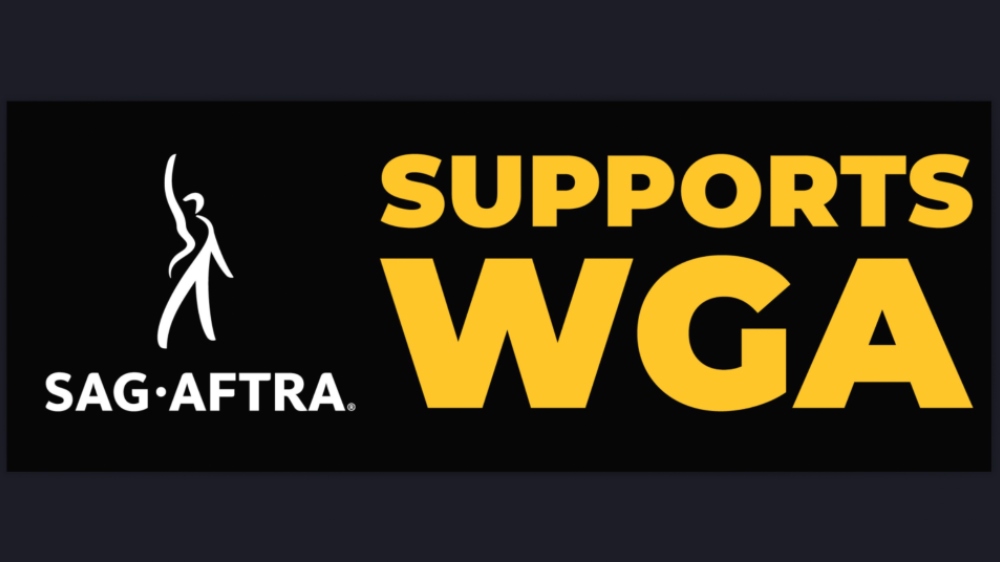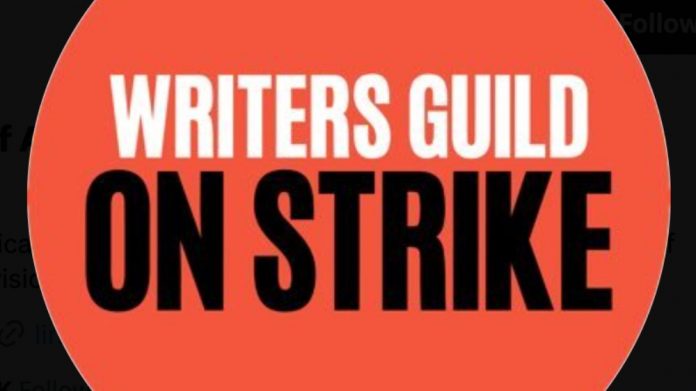A war of words broke out between the WGA and the AMPTP while I was hopping from one movie to the next on Friday afternoon up in Toronto.
It started with the WGA letting the cat out of the bag and acknowledging the elephant in the room, or whatever animal-based analogy you’d like to use — that some companies are starting to grow impatient, and have begun contemplating plans to separate from the herd. After all, some companies (cough, Netflix, cough) are benefitting from this strike, while others are hurting, and that hurt will only be exacerbated next year, as the entire summer movie season is at stake. This after the AMPTP has already written off the fall TV season.
In a statement, the WGA said that several legacy media companies — as opposed to streamers — have privately expressed “both the desire and willingness to negotiate an agreement that adequately addresses writers’ issues.”
Of course, the AMPTP called bullshit, releasing its own statement saying that “The AMPTP member companies are aligned and are negotiating together to reach a resolution. Any suggestion to the contrary is false.”
The AMPTP also offered a “helpful” timeline of events, though I’m not gullible enough to print it since pretty much everything has been in dispute since Day 1 of the strike, which has gone on far too long and could have long-lasting repercussions on both the industry and L.A’s already-precarious economy.
Could the member companies of the AMPTP splinter off and negotiate individual contracts with the WGA (and SAG-AFTRA)? Yes. Should they? Yes. Everyone has different interests here. Ego and stubbornness dictate enough of the day-to-day of Hollywood — must it really interfere here as well? But will they? Is that something I personally foresee? No, sadly. It is not.
I’m certainly not calling the WGA’s negotiating committee a bunch of liars when they say that “executives — and others — have said they are willing to negotiate on proposals that the AMPTP has presented to the public as deal breakers. On every single issue we are asking for we have had at least one legacy studio executive tell us they could accommodate us.” I don’t doubt that at all. The question is whether those executives have the power to move the needle or get a deal done. If they did, I suspect they wouldn’t feel the need to voice a desire to break off from the AMPTP… unless it was simply to save face so there’s no personal animosity when these strikes are over. And they will end. They have to. Right now, this is just a staring contest with very, very high stakes.
“We have made it clear that we will negotiate with one or more of the major studios, outside the confines of the AMPTP, to establish the new WGA deal. There is no requirement that the companies negotiate through the AMPTP,” read the release from the guild’s negotiating committee, which also warned members that the AMPTP will continue to “try to sow doubt and internal guild dissension” in the absence of a deal. Indeed, the AMPTP’s playbook is small and predictable, and if the WGA stands firm and continues to dig its heels in, some legacy studios will be forced to give serious consideration to flying solo. Once a studio begins to suspect that a rival is doing this, you’ll start to see cracks in the AMPTP’s armor. “At that point, a resolution to the strike will be in reach,” wrote the guild’s negotiating committee.
The AMPTP said it is waiting for the WGA to respond ” to the AMPTP’s most recent offers on key issues,” saying that the guild “holds the power to move this negotiation forward,” but we all know that’s not true, and the AMPTP is just stalling for time — until whatever date it has circled on The Calendar From Hell.
And if you think that’s hyperbole, let me just say that 17,000 entertainment workers have lost their jobs over the past 130 days of the Writers Strike. I’m probably weeks away from losing my own. The whole situation is royally fucked — pardon my French — and I don’t know how, the next time I see a studio head at CinemaCon, I’m supposed to look at them the same way. And I’m not even someone they have to see every day. How will the assistants look at them? The custodial staff? The (executive) commissary workers?
Why are people losing their homes and leaving Los Angeles so millionaire executives can make even more money serving the needs of faceless investors they’ll never meet? These people may invest their extra funds, but us? People like you and me? We invest our lives. I’ve given 20 years of my life to this industry, and I’m willing to bet that you have as well, and if not, then you were planning to. Well, it’s high past time for the industry to take care of people like you and me.
And if you want to argue that the industry doesn’t care about those people — about us — or that they never have cared and never will, well, eventually, they come for everyone. For example, this past week, Warner Bros. Television pulled the plug on all of its deals with A-list creators such as J.J. Abrams, Chuck Lorre, Bill Lawrence, Mindy Kaling, and Greg Berlanti. And you know what Greg Berlanti did? He donated $800,000 to the strike relief fund. You know what Greg Berlanti didn’t do? Freak out and start saying, “We’ve gotta give in to these guys and just take what they’re offering.” Of course, he can afford to pay his staff out of his own pocket, and not everyone is so fortunate.
It’s a scary time right now folks, and I’m right there with you, in case you haven’t seen me freaking out on Twitter. I’m very fortunate to have this job, as it offers me a platform that allows me to communicate with you, but everyone writing for this site has taken a pay cut because ad sales are down across the industry, though we’re still dedicated to telling your stories. And I know that when one of you is down, the rest of you will pick up the slack. The AMPTP doesn’t have that kind of unity within its ranks. Take advantage of that. And keep reading below for the full message from the WGA’s hard-nosed negotiating committee. Keep up the good work, folks!

DEAR MEMBERS,
We know that people are anxious for information about the status of the negotiation – and how difficult it can be to stay strong during periods of silence – which is only exacerbated by the companies’ recent attempts to make an end run around the Negotiating Committee and confuse the narrative. What follows is an update on where we are and how we got here. We share things we have not shared up until now, including conversations with individual executives that illustrate how some of the companies can already see a path toward making a deal, while other members of the AMPTP are not there yet.
In the 130 days since the WGA strike began, the AMPTP has only offered one proposal to the WGA, on August 11th. Since then, the companies have not moved off that proposal, even though the WGA in turn presented our own counterproposal to the AMPTP on August 15th. The current standstill is not a sign of the companies’ power but of AMPTP paralysis.
The studios and streamers bargaining together through the AMPTP have disparate business models and interests, as well as different histories and relationships with unions. They are competitors in all respects, except when they band together to deal with Hollywood labor. Through the AMPTP, these legacy studios and streamers negotiate as a united front [that] allows hard-liners to dictate the course of action for all the companies. The AMPTP purports to represent all of these disparate corporate interests, but in practice administers a system that favors inflexibility over compromise, and sacrifices the interests of individual companies in reaching a deal. That regression to the hardest line has produced the first simultaneous strikes since 1960.
In contrast, during individual conversations with legacy studio executives in the weeks since SAG-AFTRA went on strike, we have heard both the desire and willingness to negotiate an agreement that adequately addresses writers’ issues. One executive said they had reviewed our proposals, and though they did not commit to a specific deal, said our proposals would not affect their company’s bottom line and that they recognized they must give more than usual to settle this negotiation. Another said they needed a deal badly. Those same executives — and others — have said they are willing to negotiate on proposals that the AMPTP has presented to the public as deal breakers. On every single issue we are asking for we have had at least one legacy studio executive tell us they could accommodate us.
So, while the intransigence of the AMPTP structure is impeding progress, these behind-the-scenes conversations demonstrate there is a fair deal to be made that addresses our issues. Given the outsized economic impact of the strikes on the legacy companies, their individual studio interest in making a deal isn’t surprising. Warner Bros. confirmed this in a public financial filing just this week.
We have made it clear that we will negotiate with one or more of the major studios, outside the confines of the AMPTP, to establish the new WGA deal. There is no requirement that the companies negotiate through the AMPTP. So, if the economic destabilization of their own companies isn’t enough to cause a studio or two or three to either assert their own self-interest inside the AMPTP or to break away from the broken AMPTP model, perhaps Wall Street will finally make them do it.
Until there is a breakthrough, the companies and AMPTP will try to sow doubt and internal guild dissension. Keep your radar up. When the companies send messages through surrogates or the press about the unreasonableness of your guild leadership, take those messages as part of a bad-faith effort to influence negotiations and not as the objective truth.
The companies know the truth: they must negotiate if they want to end the strike. They may not like it – they may try to obscure it – but they know it. While they wrestle with that fact and with each other, they will continue attempting to get writers to settle for less than what we need and deserve, and encourage us to negotiate with ourselves. But we are not going to do that.
Instead, the companies inside the AMPTP who want a fair deal with writers must take control of the AMPTP process itself, or decide to make a deal separately. At that point, a resolution to the strike will be in reach.
We understand how painful this time is for everyone. We are all tired and hurting and scared. There is nothing wrong with saying so. The optimism for a return to negotiation has been met with a harsh reminder of how fraught this process can be. We share the frustration with how long the companies are prolonging the strike and remain committed to negotiating a fair resolution as fast as possible.
In the meantime, as always, you can find your Negotiating Committee and Board and Council members out on the picket lines. When there is anything of significance to report, we will write again.
IN SOLIDARITY,
WGA NEGOTIATING COMMITTEE



